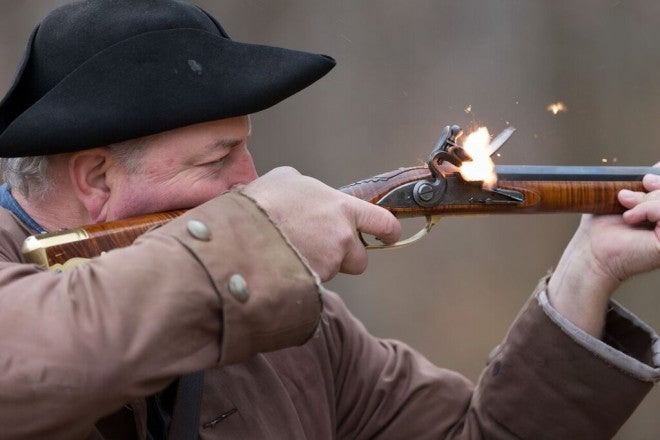The Colonial Williamsburg Foundation is opening up a musket range to the public in Williamsburg, Virginia, on March 19th and 20th. That’s right, if you are visiting the Revolutionary War re-enactor/museum complex in Williamsburg, you can attend the public range, and fire a reproduction Brown Bess Flintlock musket, as was used in the Revolutionary War. The history side of me is going crazy with envy at this moment of time, because very rarely do we get to shoot the firearms used in the conflicts we study, but even rarer is it offered to the public in this fashion. Of course, anyone who can legally purchase a firearm, can find a modern reproduction flintlock, and take it to the range. However in this case, the Colonial Williamsburg Foundation is putting on a live fire range, where the public can purchase tickets, learn about the making and use of the kinds of muskets used during the Revolutionary War, and then load, and prime one for a live round. Unfortunately the tickets are going for $119 per participant, so a little hefty on that end. But, for tourists in Virginia who might come from overseas or not have easy access to taking a flintlock rifle out to a range, this could be a fun opportunity to learn about these older firearms. If you can’t make it, or don’t want to participate in the range, I would highly recommend visiting the Yorktown battlefield/museums in the area, also run by the Foundation. They are extremely interesting, and the re-enactors certainly know their stuff when it comes to talking about life in America in the 1700s.
On a side note, I wish flintlocks were more prevalent these days within firearms training. Reason being, is that they are perfect firearms to teach new shooters correct follow through technique. This is because on most flintlocks, there is a delay between the trigger being pressed/hammer falling, and the actual ignition of the powder that propels the ball down range. This delay is usually about half a second or even a full second, but it is absolutely enough where if the shooter flinches or jerks the trigger, the entire rifle will sway off target so they won’t hit the target, or at least hit what they were aiming at. Thus, when shooting a flintlock, you have to have excellent follow through in order to successfully hit the target. A modern day equivalent of this would be a “hang fire” malfunction, where the ignition in a modern day cartridge is delayed from when the primer is struck, often due to faulty manufacturing or a bad round. But replicating this would almost border on the unsafe, as a hang fire in of itself is a malfunction.
Colonial Williamsburg’s educational musket range celebrates its grand opening March 19, for the first time offering Revolutionary City guests an opportunity to learn about and operate the types of firearms that won independence and supported life and livelihood in early America.
Guests learn from costumed interpreters about the history of flintlock weapons, particularly in colonial Virginia, their mechanics, use in hunting and defense, plus safety and proper handling.
“We provide guests an engaging, educational experience that immerses them in the period of our nation’s founding. The educational musket range embodies that, but on an entirely new level,” said Peter Seibert, Colonial Williamsburg director of historic trades and skills. “For decades our guests could learn about these pieces and watch them being operated. Now they can really experience them – the weight, the smell, and the sound – not to mention how challenging their operation was for people whose lives often depended on it.”
Guests will able to prime and fire replicas of two of early America’s most important firearms: a “Brown Bess” British short land service pattern musket and a fowling piece, a precursor of the modern shotgun.
The range’s Brown Bess replicas reflect the variety manufactured between 1768 and 1804 within a broader category spanning from 1717 and 1815. They are the type of musket used by both British and American soldiers during the American Revolution.
Muzzle-loaded fowling pieces were used to hunt ducks and other waterfowl in Tidewater Virginia and for farmland pest control. Notably, during the period they could be legally owned by free blacks for the latter purpose.
The range is accessible only by ticketed guests via a shuttle from the Williamsburg Lodge. Admission includes instruction, safety equipment firearms, ammunition, and targets.
To participate, guests must reserve spaces in advance and present photo ID to purchase tickets on-site. Tickets are $119 and are available to guests ages 14 and older. Children under 18 must be accompanied by a parent or guardian. Additional information is available at Colonial Williamsburg ticketing locations and hospitality properties, online at www.colonialwilliamsburg.com or by calling 855-296-6627.
Much thanks to Marina Q. for the tip!
 Your Privacy Choices
Your Privacy Choices
